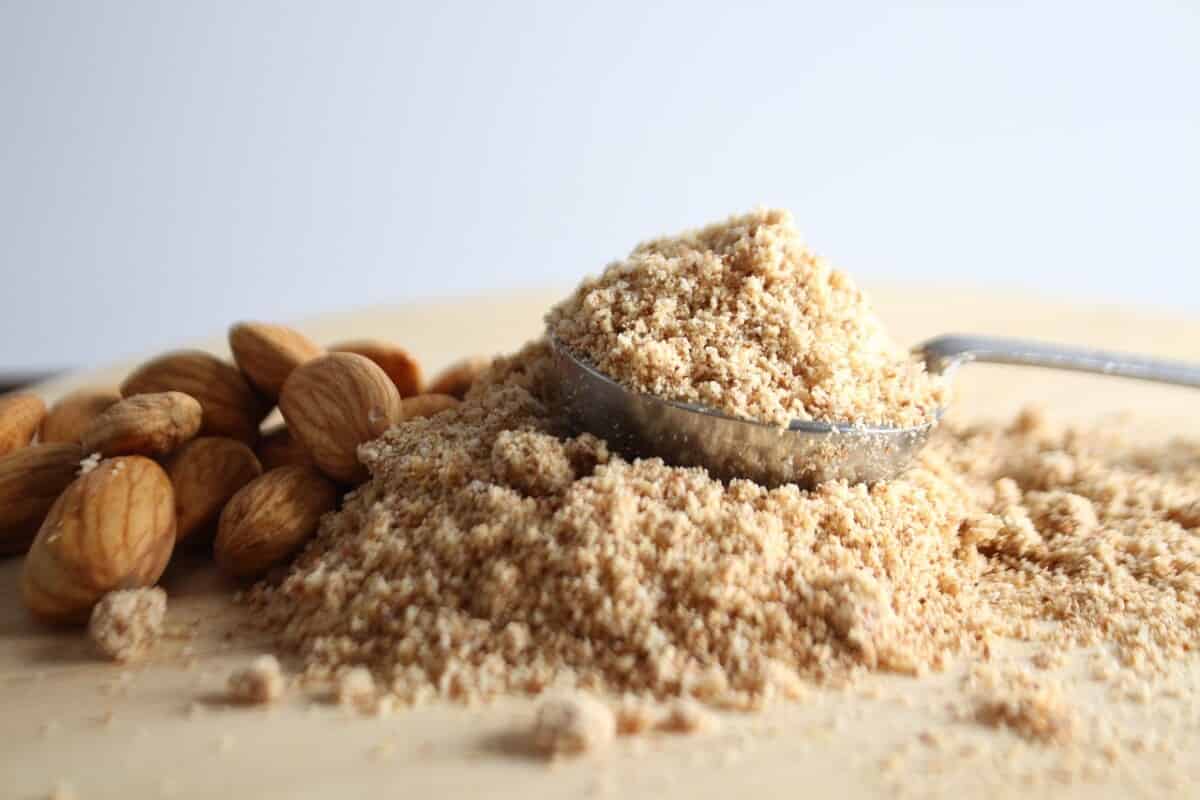Types of keto flour and how to use them.
Types of keto flour and how to use them.
Types of Keto Flour and how to use them.
On the keto diet, it’s important to limit carbohydrate intake, which means traditional wheat flour is not a good option. and on the keto diet, you will avoid all wheat products.
Also, you are getting away from gluten-free foods. And many foods contain gluten.
What is gluten?
Gluten is a type of protein found in grains such as wheat, barley, and rye. It is responsible for giving dough its elasticity and helps it to rise and hold its shape during baking.
Gluten is also commonly found in many processed foods, such as bread, pasta, and cereals, as well as in beer and other alcoholic beverages made from grains.
For individuals with celiac disease or gluten sensitivity, consuming gluten can cause a range of digestive problems, as their bodies cannot properly process the protein.
As a result, they must follow a strict gluten-free diet to avoid health complications.
Where is Gluten found?
Gluten is a protein found in wheat, barley, rye, and some other grains. Therefore, any food that contains these grains will also contain gluten.
Here are some common foods that may contain gluten:
- Bread, pastries, and baked goods made with wheat flour
- Pasta, noodles, and couscous made with wheat or semolina flour
- Breakfast cereals and granolas that contain wheat, barley, or rye
- Beer and other malted beverages
- Sauces and gravies that use wheat flour as a thickener
- Processed meats, such as sausages and hot dogs, which may contain wheat as a filler or binder
- Snack foods such as crackers, pretzels, and chips made with wheat or other gluten-containing grains
It’s important to note that many foods can contain hidden sources of gluten, so it’s essential to read labels carefully and ask questions about ingredients when eating out or purchasing packaged foods.
Additionally, some people with gluten sensitivity or celiac disease may need to avoid foods that are cross-contaminated with gluten during processing or preparation.
Is Gluten high in carbs?
Gluten itself is not high in carbs. Gluten is a protein and does not contain significant amounts of carbohydrates. However, many foods that contain gluten, such as bread, pasta, and baked goods, are high in carbohydrates due to the presence of wheat flour or other grain-based ingredients.
Carbohydrates are a macronutrient found in many foods, including grains, fruits, vegetables, and dairy products.
They provide the body with energy and are an essential part of a healthy diet. However, some people may need to limit their carbohydrate intake for various reasons, such as managing blood sugar levels or following a low-carb diet for weight loss.
If you want to limit your carbohydrate intake, it is important to read food labels carefully and look for gluten-free products that are also low in carbs.
Many gluten-free products, such as bread and pasta made from alternative flours like almond or coconut flour, can be lower in carbs than their wheat-based counterparts.
Is Semolina flour considered keto-friendly?
Semolina flour is not considered keto-friendly due to its relatively high carbohydrate content. Semolina flour is made from durum wheat and is commonly used to make pasta, bread, and other wheat-based products. A 100-gram serving of semolina flour contains around 73 grams of carbohydrates, which is significantly higher than what is typically recommended for a ketogenic diet.
Ketogenic diets are characterized by a very low carbohydrate intake, usually less than 50 grams per day, in order to induce a state of ketosis, where the body primarily burns fat for fuel instead of carbohydrates. While on a keto diet, it is important to prioritize low-carb, high-fat, and moderate-protein foods.
If you’re following a keto diet, it’s best to choose alternative flours that are lower in carbohydrates and higher in fat and fiber, such as almond flour, coconut flour, or a flaxseed meal. These options can be used as substitutes in keto-friendly recipes to achieve similar textures and flavors while keeping carbohydrate intake low.
Ps. This post contains affiliate links. If you click on a link and make a purchase, I will earn a commission (at no additional cost to you. Please know I only recommend resources and items I believe and highly recommend.

Types of keto flours.
Almond Flour –
Almond flour is the most popular flour used on the keto diet. Due to its low carb count and ease of use.
Almond flour is made from blanched almonds that have been ground into a fine powder. It’s a popular keto flour because it’s low in carbs and high in healthy fats and protein.
1. Almond flour: Almond flour is a popular keto flour that is made from ground almonds. It is high in protein, healthy fats, and fiber, and is a great option for baking.
Almond flour is relatively low in carbs compared to traditional wheat flour. Almond flour is made from ground-blanched almonds and contains fewer carbohydrates and more fiber and healthy fats.
Try finding finely ground almond flour for your recipes it will work better than the normal ground almond flour.
For example, one cup of almond flour contains about 24 grams of carbohydrates, of which 12 grams are dietary fiber, resulting in a net carb count of around 12 grams per cup.
This is significantly lower than the carb count of wheat flour, which has about 95 grams of carbs per cup.
So if you’re looking for a low-carb flour alternative, almond flour is a good option.
If you find your weight is stalling cut back on the extra goodies you are making.
Is almond flour a good alternative to consume on the keto diet?
- Yes, almond flour is a great option for the keto diet. The ketogenic diet is a high-fat, low-carbohydrate diet, and almond flour is low in carbs and high in healthy fats.
- Making it a perfect ingredient for keto-friendly recipes.
- Almond flour is also a good source of protein and fiber, which can help you feel fuller for longer periods and maintain healthy digestion. It can be used as a substitute for wheat flour in many keto-friendly recipes, including bread, pancakes, muffins, and even pizza crusts.
- When following a keto diet, it’s important to keep your carb intake low, and almond flour can help you achieve this goal. However, keep in mind that almond flour is still calorie-dense, so it’s essential to monitor your portions and not overconsume. Also, be sure to choose almond flour that is unblanched and doesn’t contain added sugars or fillers for the best nutritional value.
.

.
Salted caramel chocolate chip cookies.
1/4 cup flax seed
1 cup almond flour
¼ cup whey protein
1/4 cup coconut flour
1/2 teaspoon baking soda
1/2 cup, butter, softened
1/3 cup swerve granular
1/3 brown sugar swerve
2 teaspoons salted Carmel syrup skinny sugar-free
2 eggs
1 bag 8 oz sugar-free chocolate chips
1 cup walnuts
preheat oven to 375
Stir together all flour, baking soda.
Cream together butter, sugars, eggs, and salted Carmel syrup
Add eggs and beat well.
Gradually add flour mixture, beating well.
Stir in chocolate chips and nuts.
Drop by rounded spoonfuls onto an ungreased cookie sheet.
I love using silicon mats.
Bake for 7 to 9 minutes.
Cool completely. Makes 2 dozen.
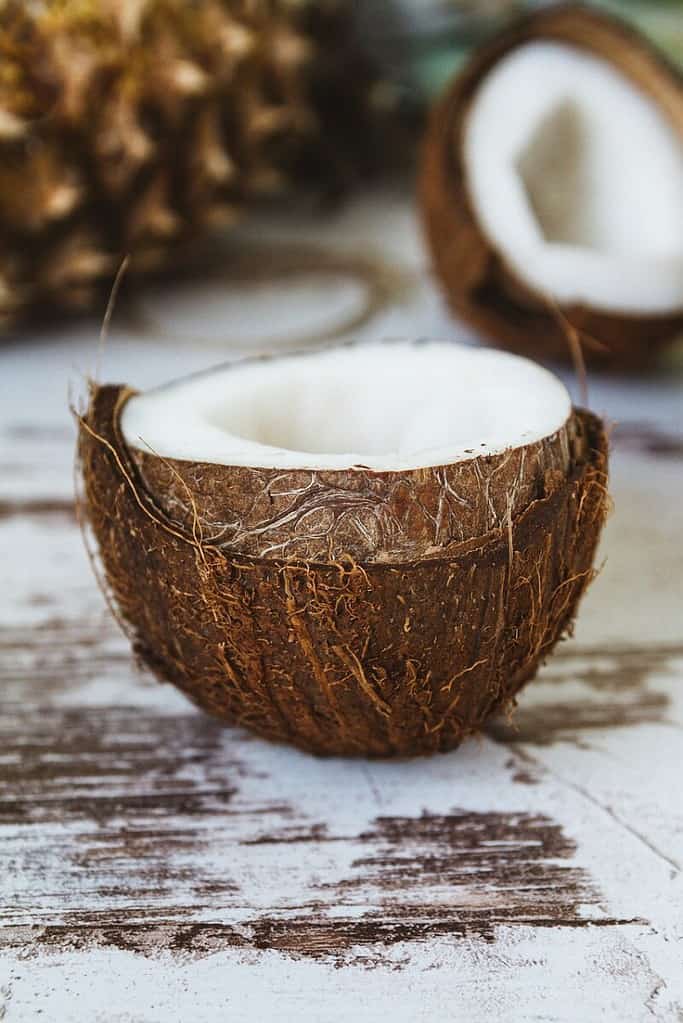
Coconut Flour –
Coconut flour is made from ground-up coconut meat. It’s a good choice for keto baking because it’s high in fiber and low in carbs.
Coconut flour can be a great addition to the keto diet, as it is low in carbohydrates and high in fiber.
The benefits of coconut flour
One of the main benefits of using coconut flour on the keto diet is that it can help you maintain ketosis. While still enjoying some of your favorite baked goods.
Coconut flour is made from dried, ground coconut meat, and it is a gluten-free, grain-free, and nut-free flour alternative.
It is high in fiber, which can help regulate blood sugar levels and improve digestive health. Additionally, coconut flour contains healthy fats, which can help keep you feeling full and satisfied.
However, it is important to note that coconut flour is also relatively high in calories, so it should be consumed in moderation as part of a balanced keto diet.
It is also important to follow recipes specifically designed for coconut flour. It behaves differently than other flours and may require different ratios of liquid and eggs.
Flaxseed Meal –
Flaxseed meal is made from ground-up flaxseeds, and it’s a great source of healthy fats and fiber. It has a nutty flavor and can be used in baking or as a thickener in sauces and gravies.
Flax seeds are a nutrient-rich food that is an excellent source of several important vitamins. Key vitamins found in flax seeds are:
- Vitamin E: Flax seeds are a great source of vitamin E, an important antioxidant that helps protect cells from damage. One tablespoon of ground flax seeds contains about 1 milligram of vitamin E.
- Vitamin B1 (Thiamine): Flax seeds are also a good source of vitamin B1. Which plays a crucial role in energy metabolism. One tablespoon of ground flax seeds provides about 8% of the daily recommended intake of thiamine.
- Vitamin B6: Flax seeds are a source of vitamin B6, which helps support brain function and the production of neurotransmitters. One tablespoon of ground flax seeds contains about 2% of the daily recommended intake of vitamin B6.
- Folate: Flax seeds also contain folate, a B vitamin that is important for healthy fetal development and the production of red blood cells. One tablespoon of ground flax seeds provides about 2% of the daily recommended intake of folate.
The vitamin content of flax seeds can vary depending on how they are processed and stored. To get the most nutritional benefit from flax seeds, it’s best to keep them in an airtight container in the refrigerator and grind them just before use.

Psyllium husk Powder
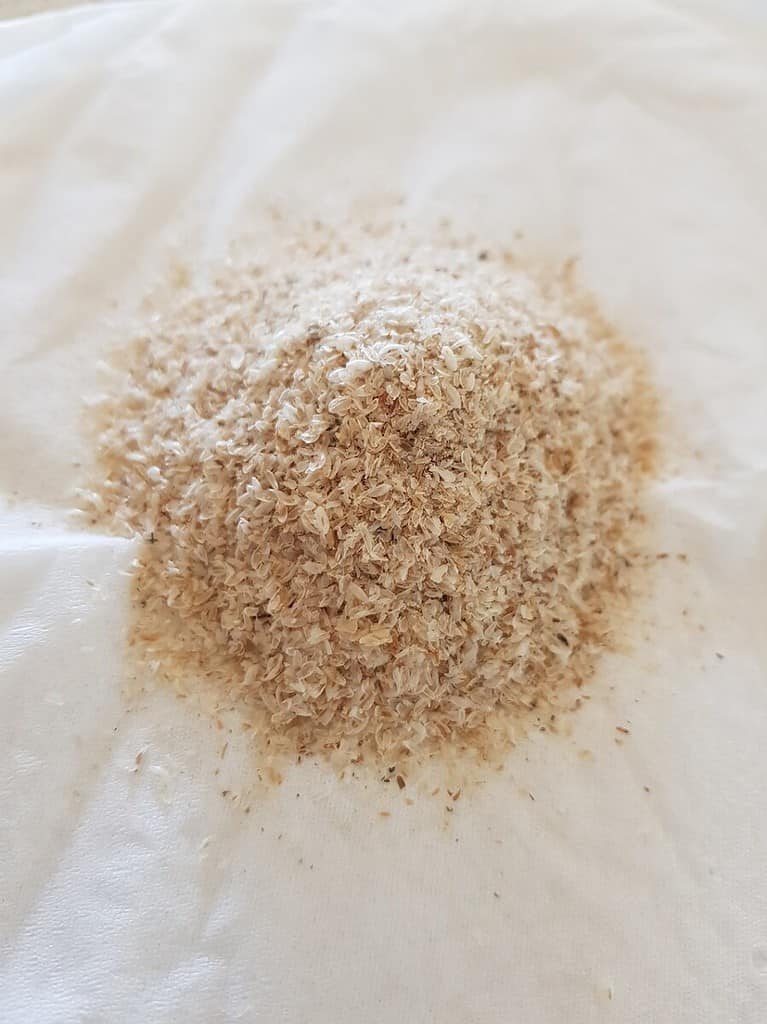
Psyllium husk powder is made from the outer layer of the seeds of the Plantago ovata plant. It’s a great source of fiber and can be used to thicken soups and stews, as well as in keto baking.
Psyllium husk powder: Psyllium husk powder is made from the husks of psyllium seeds and is high in fiber. It is often used as a thickener or binding agent in keto baking recipes.
The husk or outer coating of the seed is ground into a fine powder. Then commonly used as a dietary supplement to promote digestive health and regularity.
Psyllium husk powder is highly absorbent and can absorb many times its weight in water. When consumed, it forms a gel-like substance that can help regulate bowel movements, promote healthy digestion, and relieve constipation.
Psyllium husk powder has many benefits with a low carb count
It may also help lower cholesterol levels and improve blood sugar control in people with diabetes.
Psyllium husk powder can be mixed with water or other liquids and consumed as a drink or added to foods such as smoothies, oatmeal, or baked goods.
It is important to drink plenty of water when consuming psyllium husk powder to avoid dehydration and ensure that the powder is able to absorb properly.
Psyllium husk powder is primarily composed of fiber and contains very few carbohydrates. In fact, psyllium husk powder is often used as a low-carb alternative to flour in gluten-free and low-carb baking recipes.
One tablespoon (around 9 grams) of psyllium husk powder typically contains 8 grams of carbohydrates, but nearly all of these carbohydrates come from fiber, rather than sugars or starches.
As a result, the net carbohydrate content of psyllium husk powder is very low, making it a suitable addition to a low-carb or ketogenic diet.
Psyllium husk powder and gut health
Psyllium husk powder can promote gut health.
It is important to note, however, that psyllium husk powder should be consumed in moderation and with plenty of water to avoid potential digestive side effects such as bloating or constipation.
Psyllium husk powder can be a versatile ingredient in cooking and baking. Here are some ways you can use it:
As a binder in gluten-free baking:
Psyllium husk powder can be used as a substitute for gluten in gluten-free baking recipes. It helps provide structure and elasticity to the baked goods. Generally, you can replace about 1-2 tablespoons of psyllium husk powder for every cup of flour in a recipe.
As an egg substitute:
Psyllium husk powder can be used as an egg substitute in vegan baking or for those with egg allergies. Mix 1 tablespoon of psyllium husk powder with 3 tablespoons of water and let it sit for a few minutes to thicken. This mixture can be used to replace one egg in recipes.
To add fiber to smoothies:
Psyllium husk powder can be added to smoothies to boost their fiber content. Start with 1 teaspoon of psyllium husk powder and gradually increase the amount as desired. Be sure to drink plenty of water with the smoothie to ensure proper hydration.
In homemade gluten-free bread:
Psyllium husk powder can be used to improve the texture and structure of gluten-free bread. It helps mimic the binding properties of gluten. Add a couple of tablespoons of psyllium husk powder to your gluten-free bread dough to enhance its elasticity and rise.
As a thickening agent:
Psyllium husk powder can be used as a thickener in soups, stews, sauces, and gravies. It absorbs liquid and creates a gel-like consistency when mixed with water. Start with small amounts (e.g., 1 teaspoon) and gradually increase until you achieve the desired thickness.
Remember to always follow the specific recipe guidelines when using psyllium husk powder in your cooking and baking, as it can affect the texture and moisture content of the final product.

Sunflower Seed Flour –
Sunflower seed flour is made from ground-up sunflower seeds. It’s a good choice for keto baking because it’s low in carbs and high in healthy fats and protein.
Sunflower flour is a type of flour made from ground sunflower seeds. It is a gluten-free alternative to wheat flour, which makes it popular among people with celiac disease or gluten sensitivity.
Sunflower flour is rich in protein, fiber, healthy fats, vitamins, and minerals, including vitamin E, magnesium, selenium, and zinc.
It has a nutty flavor and a texture similar to almond flour, which makes it a suitable ingredient. Many recipes, including baked goods, pancakes, and bread.
Sunflower flour is also used as a thickener in soups, stews, and sauces. It is added to smoothies and yogurt bowls for a nutritional boost.

Sesame Seed Flour –
Sesame seed flour is made from ground-up sesame seeds, and it’s a good source of healthy fats and protein.
It has a nutty flavor and can be used in keto baking.
Sesame flour is a type of flour made from ground sesame seeds. The seeds are first toasted to enhance their nutty flavor and then ground into a fine powder.
Sesame flour is high in protein, fiber, and healthy fats, making it a nutritious keto flour.
Sesame flour can be used as a substitute for traditional wheat flour in many recipes, but it has a slightly different texture and flavor. It is also gluten-free, which makes it a great option for people with gluten sensitivities or celiac disease.
Sesame flour can be found in some specialty health food stores or online. It is important to store sesame flour in an airtight container in a cool, dry place to prevent it from going rancid.
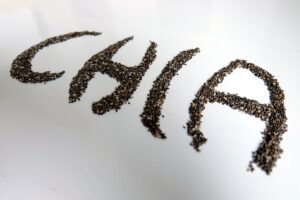
Chia seeds
Chia seeds are tiny black and white seeds that come from the plant Salvia hispanica. And is a member of the Mint family. They were originally grown in Mexico and were an important food source for the Aztecs and Mayans.
Chia seeds are rich in nutrients, including fiber, protein, omega-3 fatty acids, calcium, magnesium, and antioxidants.
They are often a healthy addition to meals, such as smoothies, yogurt, oatmeal, and salads.
They can also be mixed with water or other liquids to create a gel-like substance that can be used as an egg substitute in vegan baking recipes.
Chia seeds have become increasingly popular in recent years due to their nutritional benefits and versatility in cooking.
Chia seeds contain:
- Vitamin B1 (thiamin): Chia seeds are a good source of thiamin, which is important for energy production and the functioning of the nervous system.
- Vitamin B3 (niacin): Chia seeds are also a good source of niacin, which is important for converting food into energy and maintaining healthy skin.
- Vitamin B9 (folate): Chia seeds contain folate, which is important for cell growth and development, and can help prevent birth defects in pregnant women.
- Vitamin E: Chia seeds are a good source of vitamin E, which is an antioxidant that helps protect cells from damage.
Overall, chia seeds are a nutrient-dense food that can help provide several important vitamins and minerals as part of a balanced diet.
Can I eat chia seeds on the keto diet?
Yes, chia seeds can be consumed on the keto diet. In fact, chia seeds are a great source of fiber, healthy fats, and nutrients, making them a popular food choice for those following a ketogenic diet.
One of the key principles of the keto diet is to limit carbohydrates in order to induce a state of ketosis, where the body burns fat for energy instead of glucose.
Chia seeds are relatively low in carbohydrates, with 1 ounce (28 grams) of chia seeds containing only 12 grams of carbohydrates, of which 11 grams are fiber.
This means that chia seeds have a low net carb content, which is the total carbohydrates minus the fiber, making them a suitable food choice for those on a keto diet.
Chia seeds can be added to a variety of keto-friendly dishes, such as smoothies, chia pudding, low-carb bread and crackers, and as a topping for salads and soups. However, it’s important to keep portion sizes in mind and make sure they fit within your daily macronutrient goals.
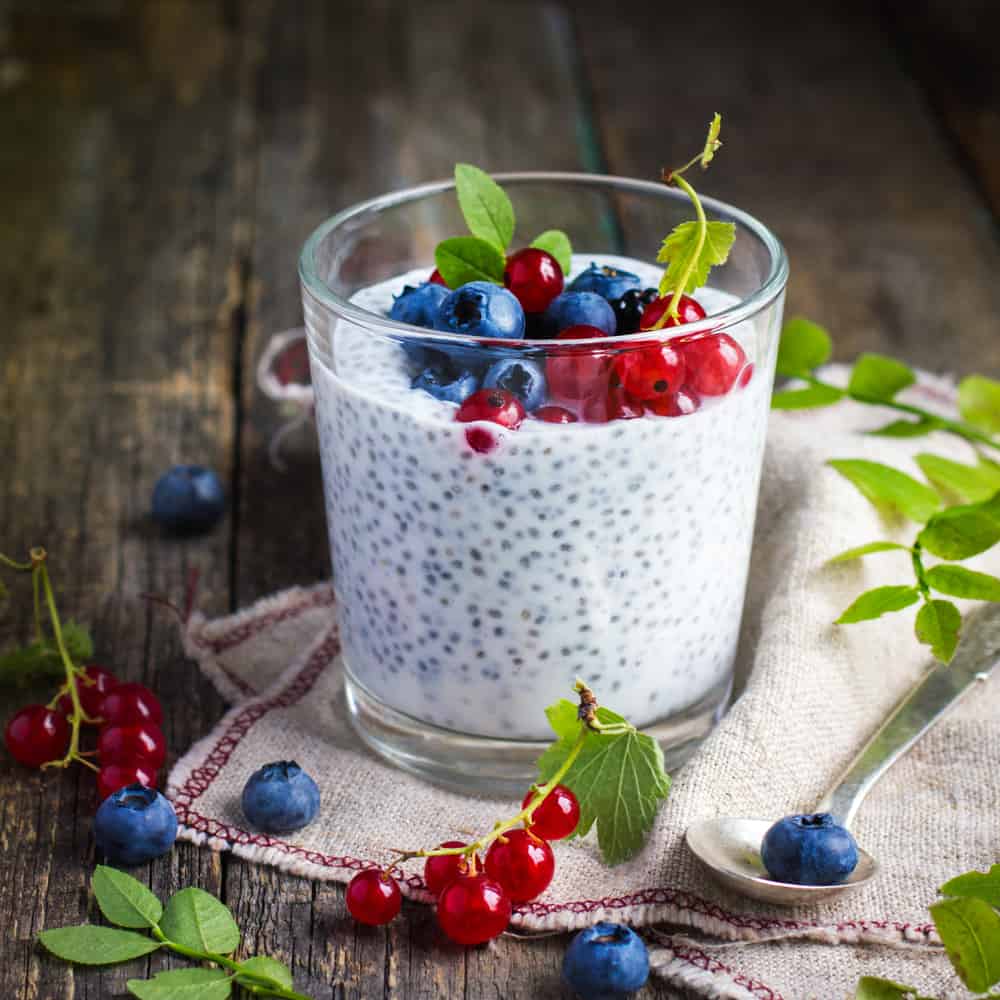
Chia seeds are not flour but can be added to your flour to add fiber, texture, and vitamins.
Try some today in your baking and add to your salads and many other foods.
In summary
Keto flours provide a fantastic foundation for creating a wide range of delicious and guilt-free treats that align with a low-carb, ketogenic diet. These flours, such as almond flour, coconut flour, and flaxseed meal, offer a versatile base for baking various keto-friendly desserts and snacks. One easy recipe that showcases the potential of keto flour is the classic almond flour chocolate chip cookies.
By replacing traditional all-purpose flour with almond flour, you can create a soft and chewy texture while keeping the carb count low. Another popular treat is coconut flour pancakes, where coconut flour acts as a grain-free alternative, resulting in fluffy and flavorful pancakes that satisfy your breakfast cravings.
The key to successfully using keto flour in these recipes is to follow proper measurements and ratios while allowing for experimentation and adjustments to achieve the desired consistency and taste. With a bit of practice, you can indulge in mouthwatering treats that not only please your taste buds but also support your ketogenic lifestyle.
This is for informational education only and is not a substitute for professional medical advice, diagnosis, or treatment. always seek the advice of your physician or other qualified health providers with any questions you may have regarding a medical condition before undertaking any diet, supplement, fitness, or other health programs.

